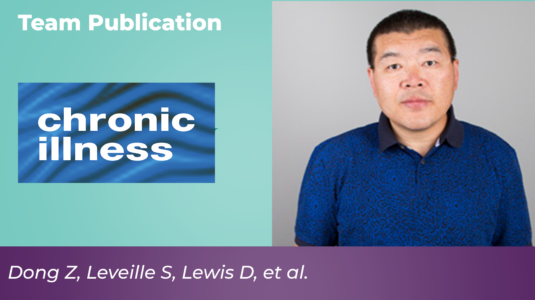Millions of Americans are care partners but they are rarely identified or supported in care delivery. With a portal-based questionnaire, we identified participants with caregiving responsibilities and further evaluated them in order to offer support.
Dong, Zhiyong
Identifying, Engaging, and Supporting Care Partners in Clinical Settings: Protocol for a Patient Portal–Based Intervention
This study aimed to implement a novel patient portal–based intervention to identify, engage, and support care partners in clinical settings. Early results suggest that the intervention could be an easily scalable and adaptable method of identifying and supporting care partners in clinical settings.
Patients and families reading their discharge summaries: A cross-sectional analysis of benefits, concerns, and implications
Rapidly spreading information transparency could transform how patients engage in care and communicate with clinicians. Patients and families report benefits from reading discharge summaries; however, over a quarter reported a concern.
People with diabetes who read their clinicians’ visit notes: Behaviors and attitudes
People with diabetes want to read their clinicians’ notes, are accessing them at high rates, and report understanding the notes and benefiting from reading them. Clinicians can encourage further engagement by enhancing the readability of notes and discussing the availability of notes with patients.
Patient online record access in English primary care: Qualitative survey study of general practitioners’ views
This study provides timely information on the views of GPs in England regarding patient access to their web-based health records. Overwhelmingly, GPs were skeptical about the benefits of access both for patients and to their practices.
Attitudes, experiences, and safety behaviours of adolescents and young adults who read visit notes: Opportunities to engage patients early in their care
Today’s adolescents and young adults have grown up immersed in technology, but their interest in and benefit from reading their care notes online is not well understood. In our study, the majority of AYA read notes and rated them as extremely important for several engagement and safety behaviours. Although a similar proportion of AYA reported definite or possible errors in their notes as adults, fewer spoke up about them, citing knowledge and cultural barriers like fear of conflict. Taken together, these findings support initiatives that encourage AYA to read notes and share concerns. Efforts that include note-reading may help transition patients from paediatric to adult care with greater autonomy, activation and safety partnership.
Patients Contributing to Visit Notes: Mixed Methods Evaluation of OurNotes
OurNotes interests patients, and providers experience it as a positive intervention. Participation by patients, care partners, clinicians, and electronic health record experts will facilitate further development.
Filling a gap in safety metrics: development of a patient-centred framework to identify and categorise patient-reported breakdowns related to the diagnostic process in ambulatory care
The PRDB framework, developed in partnership with patients/families, can help organisations identify and reliably categorise PRDBs, including some that are invisible to clinicians; guide interventions to engage patients and families as diagnostic partners; and inform whole organisational learning.
How do older patients with chronic conditions view reading open visit notes?
Authors examined the experiences with and perceptions of the effect of reading clinical outpatient visit notes on older adult patients with multiple chronic conditions at three healthcare organizations with significant experience sharing clinical notes with patients. The majority of respondents had read two or more clinical notes in the 12 months before the survey. Patients with more than two chronic conditions were more likely than those with fewer or none to report that reading their notes helped them remember their care plan, take their medications as prescribed, and understand and feel more in control of their medications. Very few patients reported feeling worried or confused about their health or medications due to reading their notes.
Association of Patients Reading Clinical Notes With Perception of Medication Adherence Among Persons With Serious Mental Illness
Surveys show that clinicians worry that patients with mental health diagnoses will become anxious, confused, or upset after reading their visit notes. In this study, we examined how patients with a mental illness diagnosis who read at least 1 clinical note in the last 12 months perceived how reading the note affected their adherence to prescribed medication.








